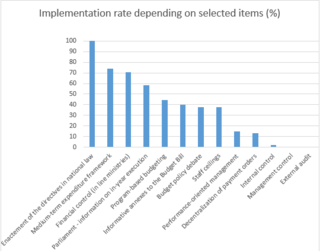Posted by Jérôme Bonherbe[2]
Directives[3] issued by the West African Economic and Monetary Union (WAEMU) contain many provisions on public financial management (PFM). These provisions include better access to budget information, multiyear budgeting, results-oriented management, decentralized budget execution, and a new accounting and financial monitoring framework. Most of the provisions relating to public information and budget formulation came into effect in 2012. The deadline for implementing the remaining provisions, mainly on budget execution and controls, is set for 2017.
The WAEMU Commission recently carried out a self-assessment of the PFM reforms required by the Directives. This exercise used a tool prepared by the Commission that includes a range of objective, evidence-based indicators for each of the six Directives. A similar approach and tool are being employed by the CEMAC Commission for its countries[4].
The results of the self-assessment exercise provides some reassurance that the implementation process is broadly on track. Most of the PFM provisions of the WAEMU Directives related to budget formulation are already being implemented by the member countries, or are about to be. The focus of the countries’ effort, and supporting technical assistance, should now turn to the provisions on budget execution (decentralized to line ministries), internal controls and audit.
Assessment of Progress
The overall results of the self-assessment were good, but gaps still remain (see Chart below). 43% of the provisions of the Directive on Budget Laws have been implemented, together with 68% of the provisions related to budget formulation that came into force in 2012. Other provisions on budget preparation such as performance budgeting, ministerial staff ceilings, and commitment authorizations, show poorer results. Only 25% of the provisions related to budget execution have been implemented, with those on internal control, management control, and external audit institutions scoring badly. (click to enhance graph below)
The performance of individual countries in implementing the Directives has been variable:
- Four countries (Mali, Senegal, Côte d’Ivoire and Benin) have implemented nearly all of the budget formulation provisions, and have made good progress in decentralizing budget execution to line ministries.
- Burkina Faso’s position is intermediate. New budget regulations were enacted recently, and progress has been made on budget preparation, and some areas related to budget execution.
- Three countries (Niger, Togo, and particularly Guinea-Bissau) still have a lot to achieve.
Lessons Learned and Next Steps in the PFM Reform Process
The self-assessment exercise should have a positive impact on encouraging reforms and leading to visible improvements in performance. It should also induce changes in the support provided by technical and financial partners. Support in the next two years is likely to focus on the more advanced provisions on budget preparation (e.g., staff ceilings, staff expenditure execution, investments), and on issues related to budget execution and controls.
The workshop framed a comprehensive strategy for the next steps, details of which will be discussed with technical partners in the coming weeks:
- Politically sensitive issues that hinder technical progress will systematically be subject to discussions between the Commission and national authorities. These issues include the organization of budget policy debates between the executive and the legislature, and the enhanced role of national audit institutions.
- The Commission maintains a network of national experts within the national ministries of finance. New or unresolved technical challenges will continue to be identified by this network, and solutions put forward with the assistance of le Pôle and other partners.
- Cooperation among sub-Saharan countries, both within and outside the WAEMU region, will be strengthened. Reference countries will be designated to assist WAEMU member states on specific issues, e.g. Mali has volunteered to provide support in decentralizing budget execution. Groups of trainers from WAEMU countries are also being set up, to deliver courses and workshops within the region.
- Much of the technical assistance will be focused on countries that have made the least progress.
Some documents related to the workshop and results of the self-assessment exercise will shortly be available on le Pôle’s website (www.le-pole.org), as will the indicators employed and the user manual.
[1] The member states of WAEMU comprise Benin, Burkina Faso, Côte d’Ivoire, Guinea Bissau, Mali, Niger, Senegal, and Togo. This article is based on a workshop organized by GIZ and Le Pôle (a joint initiative of France and the UNDP’s Regional Support Centre for Africa) on “Development Strategies and Public Finance”. The workshop brought together member states and the WAEMU Commission in Dakar in May 2016 to discuss, among other topics, the results of the self-assessment exercise.
[2] Regional Advisor for Budget and Public Finance, Le Pôle “Stratégies de développement et finances publiques”, Senegal.
[3] Directive 06/2009/CM/UEMOA on budget laws; Directive 07/2009/CM/UEMOA on the general public accounting rules; Directives 08/2009/CM/UEMOA on national budget classification; Directive 09/2009/CM/UEMOA on national chart of accounts; and Directive 10/2009/CM/UEMOA on national summary fiscal tables.
[4] Cameroon, Chad, the Central African Republic, the Republic of Congo, Equatorial Guinea, Gabon.
Note: The posts on the IMF PFM Blog should not be reported as representing the views of the IMF. The views expressed are those of the authors and do not necessarily represent those of the IMF or IMF policy.









